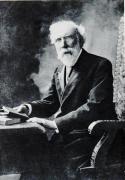|
|
||||||||||||||||||||||||
 |
Featured person
Recently added |
Thomas Hunter (1831 - 1915): |
||||||||||||||||||||||

|
| Thomas Hunter |
Thomas Hunter was born on 18 October 1831 in Ardglass, County Down, son of a sea captain whose forebears hailed from Scotland in the reign of James 1. Having lost his mother at age six, he was raised by his father, who instilled in his boy the value of learning.
At age twelve, he entered the Dundalk Institution. It was there that this future educator formed the opinion that “schoolmasters” were “horrors”; he described his experience of them “to be brutes; they flogged for the mere pleasure of inflicting pain, some of them were like demons…and the others half idiots.” But despite his painful schooling, the boy had always maintained an unshakeable sense of justice. In response to being called impertinent by a teacher after insisting he had answered a question accurately, he defiantly said, “If it be impertinent to ask justice then I am impertinent.” After four years he progressed to the Santry Science School.
After teaching for some years in Callan, County Kilkenny, Hunter’s political support for the Young Ireland movement in the national newspapers made his continued employment untenable and he emigrated to New York in 1850. Nearly penniless, he was intent on seeking any employment except teaching. Destiny led him to the occupation he once damned and he was hired as a drawing teacher at “Ward School No. 35.” “No. 35” was one of only a few public grammar schools at the time. The students were mostly poor children of immigrants with meagre prospects of a successful future. After just six years of teaching Thomas Hunter distinguished himself as a master educator.
In 1856, he sought the position of Principal. His fate was in the hands of the political bosses of “The Know-Nothing Party”. Known for their outward bigotry, especially toward immigrants, Hunter knew his chances were slim and that his future in education, and America, might soon end. But with the backing of influential educators and trustees he was unanimously elected to become the Principal of the largest and best public school in New York.
As Principal, he challenged many of the conventions formerly established. The greatest of these was in regard to discipline. The Rattan - as it was called – was a long thick medal rod, thought to be an indispensable tool for governing a class. But Hunter had always felt the practice to be shameful, and would implement it discreetly, as if to hide the dark underside of the teaching profession. Hunter said that, “boys under able teachers never, or very rarely, need corporal punishment. Punishment is usually inflicted to sustain the authority of weak or unwise teachers.” He abolished corporal punishment in his school, replacing it with a system involving moral discipline, with detention, suspension, and expulsion as consequences for insubordination. Thereafter he declared, “I no longer punish, those who violated written laws punish themselves.” His system was eventually adopted through the USA.
Hunter’s achievement at “No. 35”- great as it was- was only the preparation for what he will always be remembered for. In 1870 he founded the Female Normal and High School in New York City, now known as Hunter College and became its first President, a position he held for 37 years. During his tenure as President, the school became known for its impartiality regarding race; religion; ethnicity; financial or political favouritism; its pursuit of higher education for women; its high entry requirements, and its rigorous academics. The college's student population quickly expanded.
Today, Hunter College is a comprehensive teaching and research institution. Of the more than 20,000 students enrolled at Hunter, nearly 5,000 are enrolled in a graduate program, the most popular of which are education and social work. Although less than one third of students are the first in their families to attend college, the college maintains its tradition of concern for women's education, with nearly three out of four students being female. In 2006, Hunter became home to the Bella Abzug Leadership Institute, which will run training programs for young women to build their leadership, public speaking, business and advocacy skills. Princeton Review named the college as one of America's "Best Value" Colleges in its 2007 guide.
| Born: | 18 October 1831 |
| Died: | 14 October 1915 |
| Patrick Devlin |


Home | Our Policies | Plaques | Browse | Search | Sponsors | Links | Help | Contact
Privacy & Disclaimer | Cookie Policy | Site Map | Website Design By K-Point
© 2024 Ulster History Circle









